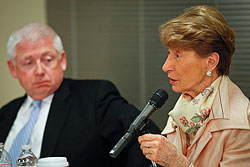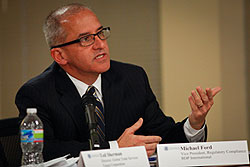|  |   |  Trade Advisory Committee Convenes in Washington, Hears Program Updates
(Thursday, March 01, 2012)
 |  | click for hi-res
 | | COAC members George Weise and Carol Hallett (l-r), both former commissioners of CBP’s legacy agency, the U.S. Customs Service, shared their views during the trade advisory group’s meeting held on February 21, in Washington, DC. |
| |
Photo Credit: James Tourtellotte |
|
|  |  |
On President’s Day, in true patriotic spirit, members of the Advisory Committee on Commercial Operations of Customs and Border Protection, also known as COAC, traveled from around the country to meet Tuesday in the nation’s capital. The meeting was the trade advisory group’s first public gathering in 2012. It also was the first time the committee had convened since the departure of Commissioner Alan Bersin, who was named the Department of Homeland Security’s assistant secretary of international affairs in December. Members of the COAC were welcomed by Allen Gina, the assistant commissioner of CBP’s Office of International Trade, who co-chaired the proceedings with Timothy Skud, the deputy assistant secretary of tax, trade, and tariff policy for the U.S. Department of Treasury. In his opening remarks, Gina explained that he was sitting in for Acting Commissioner David Aguilar, who was traveling with Secretary Napolitano in South Texas. “Although he could not be here in person,” said Gina, “he asked me to convey his personal commitment to working closely with COAC and his continued support for the important work being done by the various subcommittees.” Gina acknowledged that 2011 was an exceptional year for the advisory committee. “You have all provided innovative ideas and helped CBP move forward on a number of issues critically important to American business—and the U.S. government,” he said. Gina also underscored the value of the committee’s input. “For the sake of our security and economy, our partnership with the trade community is paramount. Many in this room have devoted your valuable time and energy helping CBP develop our trade and security programs—and for that we thank you,” said Gina. Before opening the floor for business, Gina welcomed COAC’s newest member, Julie Ann Parks, senior manager for export/import operations at the Raytheon Company. Parks is replacing David J. Vitale, who resigned last September after he was named the president of the Chicago Board of Education. Gina also congratulated the Department of Homeland Security’s presiding officer Ellen McClain on her recent appointment as the Department’s deputy assistant secretary for transborder policy. The meeting included updates on trade programs and COAC subcommittee work. Among the topics discussed was the One U.S. Government at the Border initiative. “We’re looking at the import process from start to finish to identify redundancies that might exist today,” said Michael Ford, vice president of regulatory compliance and quality for BDP International, a customs house brokerage and freight forwarding firm. Ford explained that he and the subcommittee’s other trade co-chair, Ted Sherman, director of global trade services for Target Corporation, were meeting with various government agencies. “We’re sitting down and discussing how we can improve these processes together,” said Ford. “Hopefully, we can lay a foundation that will build a process that will work, that’s sustainable, and doesn’t have us all collectively drowning in paper, courier packages, and different data for different agencies,” said Sherman, noting that the complexity of the import process is growing. The importance of finding funding for CBP’s automated trade processing system, the Automated Commercial Environment, or ACE, was also duly noted. “You can’t really have a simplified entry process that’s going to lower transaction costs without ACE,” said George Weise, executive vice president of Sandler & Travis Trade Advisory Services and a former commissioner of CBP’s legacy agency, the U.S. Customs Service. “We need to understand that there is a sense of urgency in these two issues. And candidly, collectively all of us in this room are facing a crisis that we aren’t getting the funds necessary to get ACE delivered to get things like simplified entry in place,” said Weise. “We need to have our voices heard on the Hill. We’ve got to get the funds. We’ve got to get this moving forward. It’s 20 years overdue.”  | click for hi-res
 | | COAC member Michael Ford gives an update on his subcommittee’s work on the One U.S. Government at the Border initiative during a meeting with the Advisory Committee on Commercial Operations. |
| |
Photo Credit: James Tourtellotte |
|
|  |  |
Air cargo security was another topic highlighted at the meeting. “Everybody has pointed to ACAS [the Air Cargo Advance Screening pilot program] as a great example of partnership between government and the private sector, and it certainly has been that,” said Barbara Vatier, the COAC subcommittee co-chair. The ACAS pilot program, a joint effort with CBP, the Transportation Security Administration, and the air cargo community, was launched in December 2010 in response to a foiled terrorist plot in which explosive devices were planted within cargo shipments on board aircraft bound for the U.S. The pilot program’s objective is to receive pre-departure cargo data globally to allow CBP and TSA to conduct joint security risk analysis to identify potential threats to aviation. “We’ve had over 12 million transmissions already that we’ve been able to verify through our ACAS pilot,” said Dan Baldwin, executive director of CBP’s Cargo and Conveyance Security Programs. “Less than one percent of those numbers have required some kind of adjudication either foreign or domestic.” What this means said Baldwin is “that we’re keeping aviation security at its optimal level.” The pilot, which has entered its second phase, now includes passenger carriers and freight forwarders in addition to express consignment operators. “It’s very important that we get a good representation from the entire industry,” said Kim Costner Moore, TSA’s assistant general manager for air cargo security. “We want everybody to come to the table to help us build a system the right way.” Some of the other issues that were discussed at the meeting include a broker revision project, intellectual property rights enforcement, risk-based bonding and risk factors, and the National Strategy for Global Supply Chain Security, which was approved by President Obama in January. Shortly before the conclusion of the meeting, Acting Deputy Commissioner Thomas Winkowski joined the proceedings. “We have a challenging year in front of us,” he said, noting the current budgetary constraints. “I think we all have to recognize that we have to do a better job of prioritizing projects. We need to have a clear vision and a clear understanding of what’s important to CBP and the trade community.” On that note, COAC co-chair Tim Skud concluded the meeting by encouraging members to look for superfluous regulations. “We know we have some regulations that are more burdensome than they ought to be,” said Skud. “There are lots of opportunities out there for simplifying—maybe even doing away with regulations. As you do your work in preparation for the next meeting, keep an eye out for what kind of regulations we could get rid of, what regulations are hard to comply with, and what regulations are too expensive to comply with. Is there a cheaper way to accomplish our goals?” COAC is a 20-member advisory committee that was established by Congress in 1987. The committee provides advice and recommendations to CBP and the Department of the Treasury on the commercial operations of CBP and trade-related interdepartmental functions. Some of the issues that COAC focuses on include enhanced border and supply chain security, international efforts to harmonize customs practices and procedures, import safety, compliance, and modernization and automation processes used to facilitate trade. The next COAC meeting is scheduled to be held in Savannah, Georgia on May 22. |   prev | next prev | next | (40 of 50)
|
| back to News Highlights |
|
|  |  |  |
|